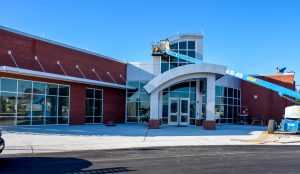18 Dec Culinary Instruction During COVID
Culinary Instruction During COVID
 Morehead City, N.C. (December 18, 2020) – In March when the Coronavirus brought all of North Carolina and much of the United States to a standstill, it was clear that the culinary and hospitality businesses would be impacted. Like the hospitality businesses, educating future hospitality and culinary arts workers was also impacted as the result of COVID.
Morehead City, N.C. (December 18, 2020) – In March when the Coronavirus brought all of North Carolina and much of the United States to a standstill, it was clear that the culinary and hospitality businesses would be impacted. Like the hospitality businesses, educating future hospitality and culinary arts workers was also impacted as the result of COVID.
Instructors had to rethink the curriculum and even the physical way they taught their students. Now, instructors are teaching their students in a COVID-safe environment — taking temperatures at the door, wearing masks and having the students remain six-feet apart in the kitchens and classrooms.
Teaching six-feet apart has proven tricky in some programs due to the small culinary kitchens. However, the programs will move into the new Hospitality and Culinary Arts Center in January and that will make spacing easier. For the remainder of the semester, the instructors are getting creative.
Instructors are trying to move any part of instruction they can online. However, the programs do have some lab classes where the students need to be onsite for hands-on learning.
“I have some students who are reluctant to come to the in-person labs, because they are worried about getting Coronavirus,” said Chef Charles Park, Chair for Hospitality, Culinary, and Baking & Pastry Arts at Carteret Community College. “We are wearing masks, offer face shields, wash our hands and are six-feet apart, but some students are still concerned. I have
rearranged some of my class meeting times so the classes don’t overlap in the kitchens and less students are in the kitchen at a time. Right now, we have 3-6 students in the kitchen at a time.”
The instructors are also teaching students COVID-safety procedures as part of the curriculum. They are teaching students how to address safety concerns that patrons have and how to address concerns of their future employees. Another component of hospitality instruction during a pandemic is to teach the students how to be open to change and to think creatively, which will help their future businesses survive.
“We are teaching students that during 2020 and times of crisis that they are going to have to adjust their business plans,” said Shana Olmstead. “Normally, we teach our students to create a business plan, stick to it and make changes as necessary. In 2020, that scenario is not possible. Creative thinking and business survival instincts are the best tools we can equip our students with.”
Olmstead explained that in the current conditions, some restaurant owners are only open for five hours a day. They are challenged with how to bring in enough business during those hours and at 50 percent capacity to be able to continue operating.
“No restaurant prepared that scenario in their business plans,” said Olmstead. “But, this is 2020. Everything we knew went out the window.”
Tourism is Carteret County’s largest industry sector. Many local businesses depend on Carteret Community College to educate their future workers.
“My wish is that Carteret County businesses will see this new Hospitality and Culinary Arts Center and know that Carteret Community College hasn’t given up on the hospitality and restaurant industry. In the middle of this crisis, the College continues to build this beautiful building and that it’s more than classrooms, it is a symbol of hope,” said Olmstead. “While times are tough for our industry right now, Carteret Community College hasn’t given up hope that we will come out of this crisis stronger and better.”
If you are interested in learning more about Carteret Community College’s programs, call 252-222-6000 or visit www.Carteret.edu.
###



